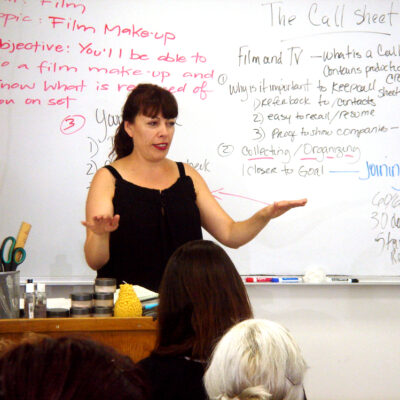November 16, 2012
Industry Speaks: Veronica Lane On Organization for Make-Up Arists
In an ever changing entertainment industry, working as a freelance makeup artist has its challenges. Though very rewarding, involvement in this line of work takes strong organization skills and lacking in this area can greatly affect an artist’s experience in a negative way.
It was a pleasure for us to welcome Make-Up Designory’s very own Veronica Lane for our Industry Speaks lecture series, to speak about the importance of organization as a freelance makeup artist.
Veronica Lane has been a Professional Makeup & Hair Artist for over twenty years. From films to television, Reality T.V., commercials, fashion shoots, advertising, press junkets, and working with personal clients, she has done it all! She loves to teach others and share her knowledge about the entertainment industry. In the 1990’s, she worked for and taught seasonal makeup collections for the world renowned hair and makeup company Sebastian International. She also worked for the Max Factor Museum and Boutique where she first got her taste of makeup and design. She has been a freelance make-up artist for over twelve years and she continues to be a force in a competitive industry.
One of the most important tools to use in organization, as a makeup artist, is the call sheet. As organization is the most obvious function of a call sheet, there are many other less obvious functions of call sheets. Call sheets are instrumental in tracking your jobs, as well as production companies and photographers that you’ve worked with. It also serves as proof to show places like IMBD for recording your job history. Record of your job history as a makeup artist is important for exposure and a stronger name for future jobs.
Another important aspect of a call sheet is to have something to build your resume against. A strong resume in the line of freelance makeup artistry is vital in marketing yourself for possible future jobs. Rather than relying on your memory for your job history, call sheets serve as detailed information on each job that you’ve worked at. When adding job experience to your resume, it is important to separate the different job types; hair only and makeup only.
When combining hair and makeup together, it could potentially be seen as “vanity,” which may not be the type of style a potential job is looking for.
Lastly, call sheets can also lead to proving eligibility for the union. Although this will not be your main proof of job history, it may still serve as backup documentation, and the more backup proof you have, the better. You can also contact the Production Company you worked for, and request a letter of proof stating that you did in fact work with them. All documents that you accumulate should be kept in a file designated for backup documentation. The preferable method is using binders organized by year.
Some final suggestions and advice that Veronica offered to makeup artists starting out:
Call sheets are an organization tool and do not act as official documents. They are mainly for the makeup artist to keep for themselves, and serve as backup. Never assume that this is the only thing you need for official records. Avoid being paid in cash as “Call Sheets + cash jobs = no proof.” Save a copy of all the paperwork from all jobs and if possible, do your invoicing on a computer where you can safely save them. Most importantly, do not ever assume that any company or website will keep track of your work history for you. It is up to you to manage and log your own work experience, making sure your information on everything is accurate.
“The more organized you are, the easier it will be.”- Veronica Lane.
www.veronicalane.com


Leave a Reply